Baby's Mother Tongue Acquisition
VerifiedAdded on 2020/07/22
|7
|1687
|106
AI Summary
This assignment delves into the fascinating process of how babies learn their mother tongue. It discusses three key processes involved in this acquisition: learning through natural exposure, developing language skills with minor effort, and the significant influence of maternal interaction. Additionally, it evaluates three prominent language teaching methods: Direct Method, Grammar Translation Method, and Audio Lingual Method.
Contribute Materials
Your contribution can guide someone’s learning journey. Share your
documents today.

Teaching English
Secure Best Marks with AI Grader
Need help grading? Try our AI Grader for instant feedback on your assignments.
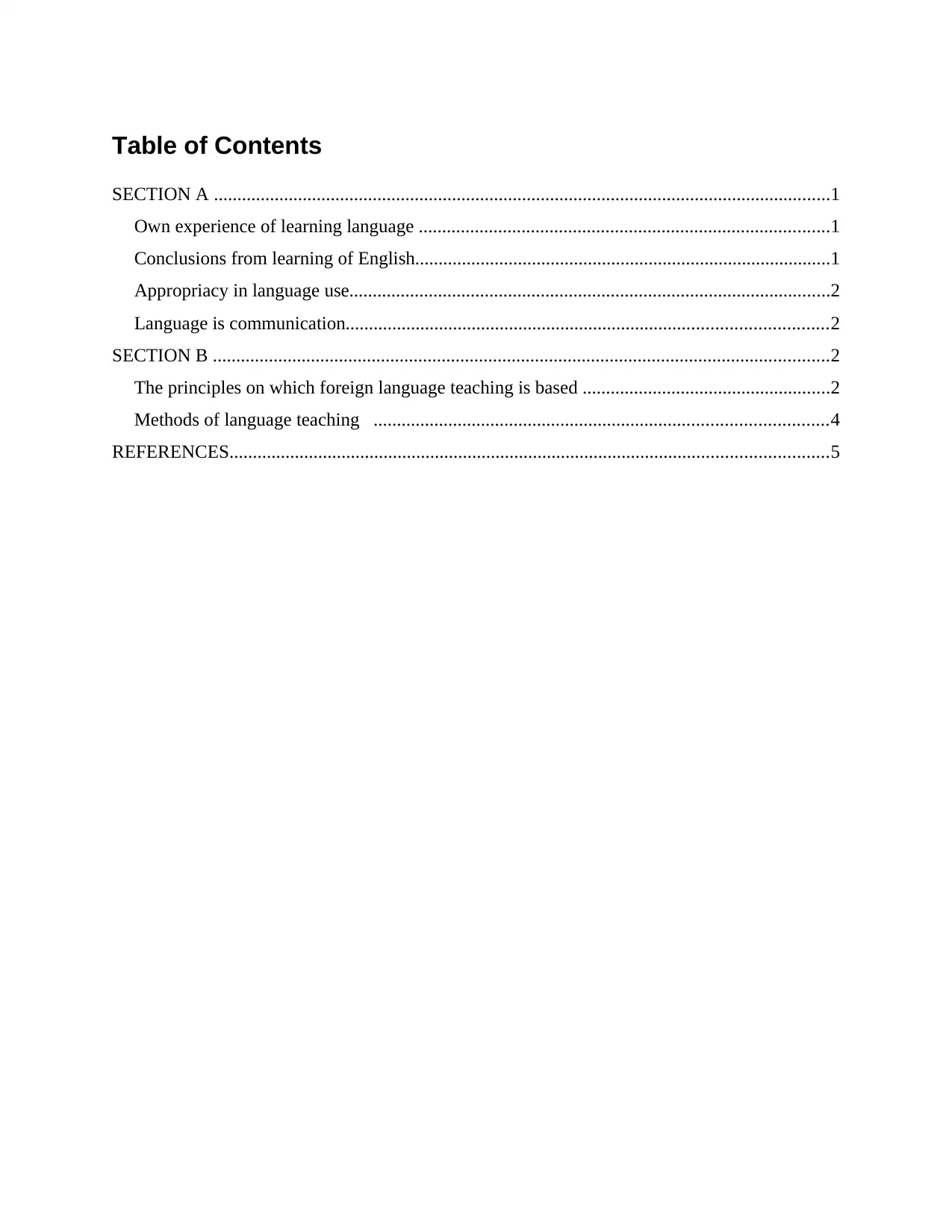
Table of Contents
SECTION A ....................................................................................................................................1
Own experience of learning language ........................................................................................1
Conclusions from learning of English.........................................................................................1
Appropriacy in language use.......................................................................................................2
Language is communication.......................................................................................................2
SECTION B ....................................................................................................................................2
The principles on which foreign language teaching is based .....................................................2
Methods of language teaching .................................................................................................4
REFERENCES................................................................................................................................5
SECTION A ....................................................................................................................................1
Own experience of learning language ........................................................................................1
Conclusions from learning of English.........................................................................................1
Appropriacy in language use.......................................................................................................2
Language is communication.......................................................................................................2
SECTION B ....................................................................................................................................2
The principles on which foreign language teaching is based .....................................................2
Methods of language teaching .................................................................................................4
REFERENCES................................................................................................................................5
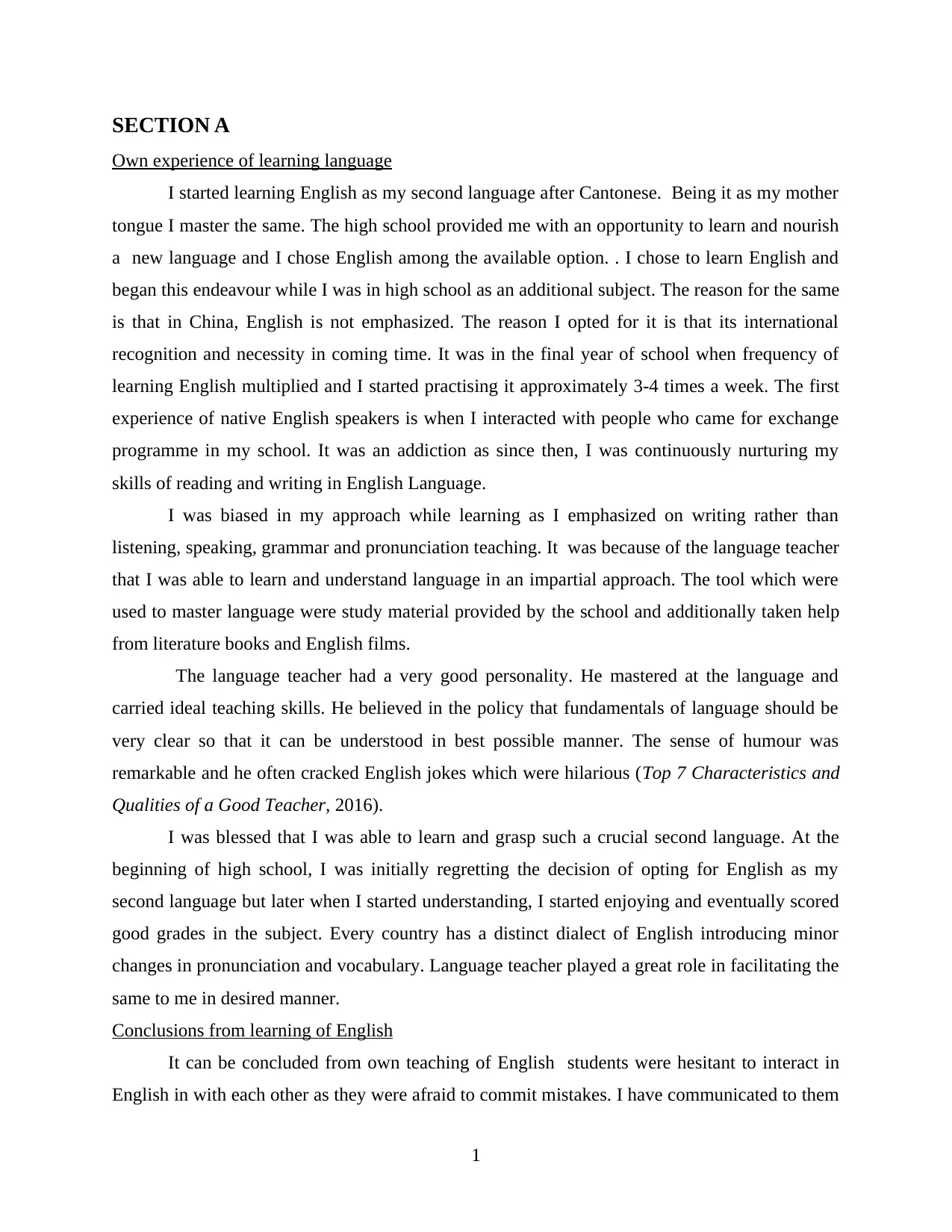
SECTION A
Own experience of learning language
I started learning English as my second language after Cantonese. Being it as my mother
tongue I master the same. The high school provided me with an opportunity to learn and nourish
a new language and I chose English among the available option. . I chose to learn English and
began this endeavour while I was in high school as an additional subject. The reason for the same
is that in China, English is not emphasized. The reason I opted for it is that its international
recognition and necessity in coming time. It was in the final year of school when frequency of
learning English multiplied and I started practising it approximately 3-4 times a week. The first
experience of native English speakers is when I interacted with people who came for exchange
programme in my school. It was an addiction as since then, I was continuously nurturing my
skills of reading and writing in English Language.
I was biased in my approach while learning as I emphasized on writing rather than
listening, speaking, grammar and pronunciation teaching. It was because of the language teacher
that I was able to learn and understand language in an impartial approach. The tool which were
used to master language were study material provided by the school and additionally taken help
from literature books and English films.
The language teacher had a very good personality. He mastered at the language and
carried ideal teaching skills. He believed in the policy that fundamentals of language should be
very clear so that it can be understood in best possible manner. The sense of humour was
remarkable and he often cracked English jokes which were hilarious (Top 7 Characteristics and
Qualities of a Good Teacher, 2016).
I was blessed that I was able to learn and grasp such a crucial second language. At the
beginning of high school, I was initially regretting the decision of opting for English as my
second language but later when I started understanding, I started enjoying and eventually scored
good grades in the subject. Every country has a distinct dialect of English introducing minor
changes in pronunciation and vocabulary. Language teacher played a great role in facilitating the
same to me in desired manner.
Conclusions from learning of English
It can be concluded from own teaching of English students were hesitant to interact in
English in with each other as they were afraid to commit mistakes. I have communicated to them
1
Own experience of learning language
I started learning English as my second language after Cantonese. Being it as my mother
tongue I master the same. The high school provided me with an opportunity to learn and nourish
a new language and I chose English among the available option. . I chose to learn English and
began this endeavour while I was in high school as an additional subject. The reason for the same
is that in China, English is not emphasized. The reason I opted for it is that its international
recognition and necessity in coming time. It was in the final year of school when frequency of
learning English multiplied and I started practising it approximately 3-4 times a week. The first
experience of native English speakers is when I interacted with people who came for exchange
programme in my school. It was an addiction as since then, I was continuously nurturing my
skills of reading and writing in English Language.
I was biased in my approach while learning as I emphasized on writing rather than
listening, speaking, grammar and pronunciation teaching. It was because of the language teacher
that I was able to learn and understand language in an impartial approach. The tool which were
used to master language were study material provided by the school and additionally taken help
from literature books and English films.
The language teacher had a very good personality. He mastered at the language and
carried ideal teaching skills. He believed in the policy that fundamentals of language should be
very clear so that it can be understood in best possible manner. The sense of humour was
remarkable and he often cracked English jokes which were hilarious (Top 7 Characteristics and
Qualities of a Good Teacher, 2016).
I was blessed that I was able to learn and grasp such a crucial second language. At the
beginning of high school, I was initially regretting the decision of opting for English as my
second language but later when I started understanding, I started enjoying and eventually scored
good grades in the subject. Every country has a distinct dialect of English introducing minor
changes in pronunciation and vocabulary. Language teacher played a great role in facilitating the
same to me in desired manner.
Conclusions from learning of English
It can be concluded from own teaching of English students were hesitant to interact in
English in with each other as they were afraid to commit mistakes. I have communicated to them
1
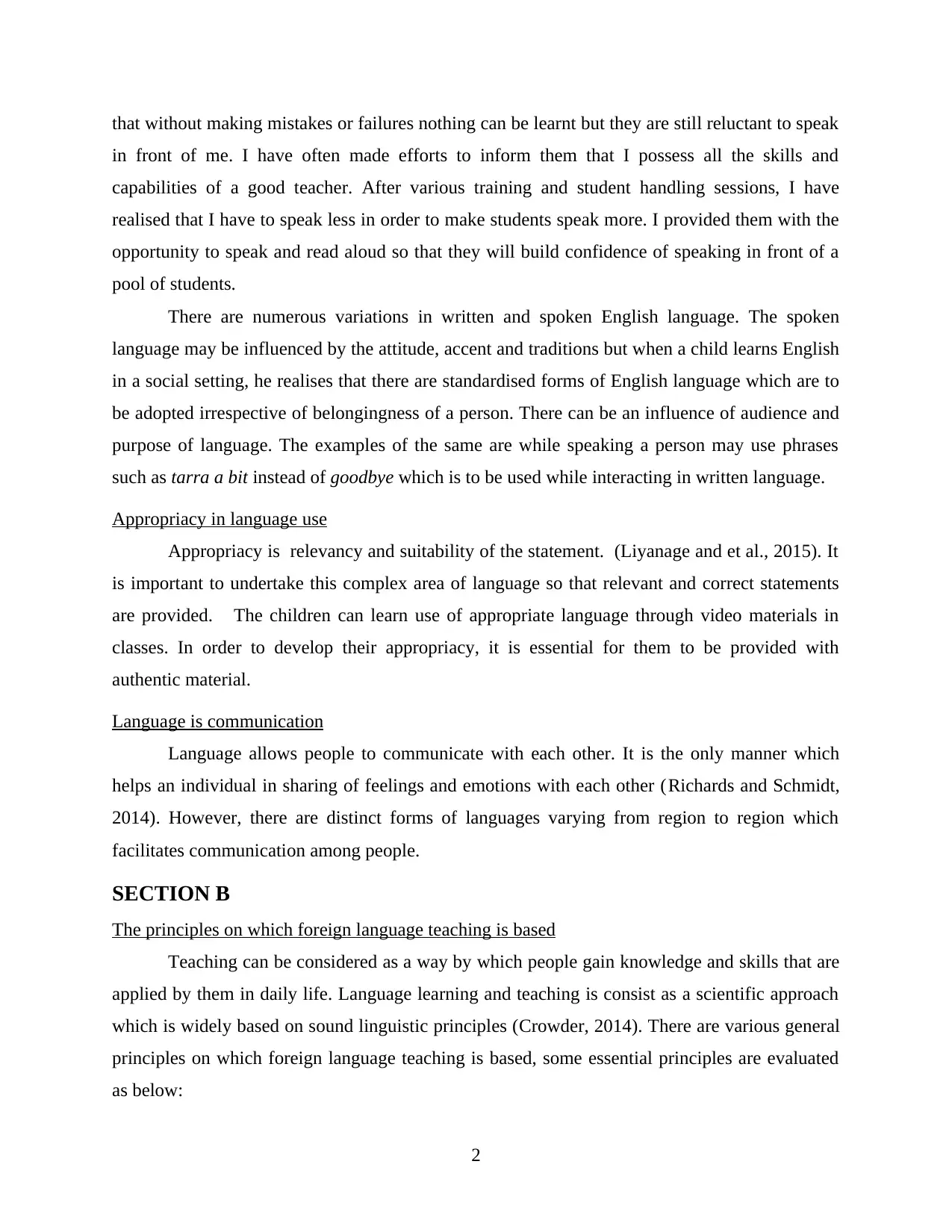
that without making mistakes or failures nothing can be learnt but they are still reluctant to speak
in front of me. I have often made efforts to inform them that I possess all the skills and
capabilities of a good teacher. After various training and student handling sessions, I have
realised that I have to speak less in order to make students speak more. I provided them with the
opportunity to speak and read aloud so that they will build confidence of speaking in front of a
pool of students.
There are numerous variations in written and spoken English language. The spoken
language may be influenced by the attitude, accent and traditions but when a child learns English
in a social setting, he realises that there are standardised forms of English language which are to
be adopted irrespective of belongingness of a person. There can be an influence of audience and
purpose of language. The examples of the same are while speaking a person may use phrases
such as tarra a bit instead of goodbye which is to be used while interacting in written language.
Appropriacy in language use
Appropriacy is relevancy and suitability of the statement. (Liyanage and et al., 2015). It
is important to undertake this complex area of language so that relevant and correct statements
are provided. The children can learn use of appropriate language through video materials in
classes. In order to develop their appropriacy, it is essential for them to be provided with
authentic material.
Language is communication
Language allows people to communicate with each other. It is the only manner which
helps an individual in sharing of feelings and emotions with each other (Richards and Schmidt,
2014). However, there are distinct forms of languages varying from region to region which
facilitates communication among people.
SECTION B
The principles on which foreign language teaching is based
Teaching can be considered as a way by which people gain knowledge and skills that are
applied by them in daily life. Language learning and teaching is consist as a scientific approach
which is widely based on sound linguistic principles (Crowder, 2014). There are various general
principles on which foreign language teaching is based, some essential principles are evaluated
as below:
2
in front of me. I have often made efforts to inform them that I possess all the skills and
capabilities of a good teacher. After various training and student handling sessions, I have
realised that I have to speak less in order to make students speak more. I provided them with the
opportunity to speak and read aloud so that they will build confidence of speaking in front of a
pool of students.
There are numerous variations in written and spoken English language. The spoken
language may be influenced by the attitude, accent and traditions but when a child learns English
in a social setting, he realises that there are standardised forms of English language which are to
be adopted irrespective of belongingness of a person. There can be an influence of audience and
purpose of language. The examples of the same are while speaking a person may use phrases
such as tarra a bit instead of goodbye which is to be used while interacting in written language.
Appropriacy in language use
Appropriacy is relevancy and suitability of the statement. (Liyanage and et al., 2015). It
is important to undertake this complex area of language so that relevant and correct statements
are provided. The children can learn use of appropriate language through video materials in
classes. In order to develop their appropriacy, it is essential for them to be provided with
authentic material.
Language is communication
Language allows people to communicate with each other. It is the only manner which
helps an individual in sharing of feelings and emotions with each other (Richards and Schmidt,
2014). However, there are distinct forms of languages varying from region to region which
facilitates communication among people.
SECTION B
The principles on which foreign language teaching is based
Teaching can be considered as a way by which people gain knowledge and skills that are
applied by them in daily life. Language learning and teaching is consist as a scientific approach
which is widely based on sound linguistic principles (Crowder, 2014). There are various general
principles on which foreign language teaching is based, some essential principles are evaluated
as below:
2
Secure Best Marks with AI Grader
Need help grading? Try our AI Grader for instant feedback on your assignments.
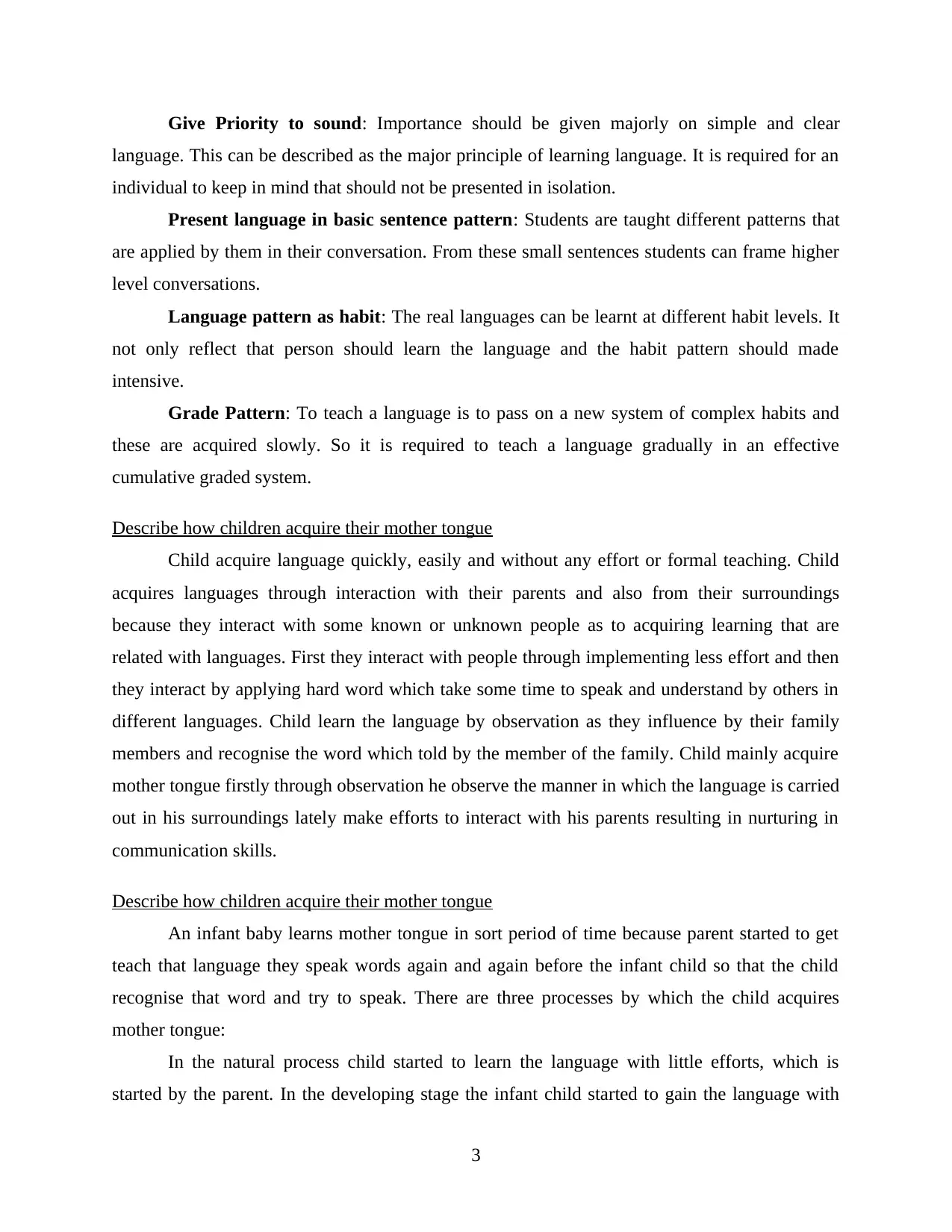
Give Priority to sound: Importance should be given majorly on simple and clear
language. This can be described as the major principle of learning language. It is required for an
individual to keep in mind that should not be presented in isolation.
Present language in basic sentence pattern: Students are taught different patterns that
are applied by them in their conversation. From these small sentences students can frame higher
level conversations.
Language pattern as habit: The real languages can be learnt at different habit levels. It
not only reflect that person should learn the language and the habit pattern should made
intensive.
Grade Pattern: To teach a language is to pass on a new system of complex habits and
these are acquired slowly. So it is required to teach a language gradually in an effective
cumulative graded system.
Describe how children acquire their mother tongue
Child acquire language quickly, easily and without any effort or formal teaching. Child
acquires languages through interaction with their parents and also from their surroundings
because they interact with some known or unknown people as to acquiring learning that are
related with languages. First they interact with people through implementing less effort and then
they interact by applying hard word which take some time to speak and understand by others in
different languages. Child learn the language by observation as they influence by their family
members and recognise the word which told by the member of the family. Child mainly acquire
mother tongue firstly through observation he observe the manner in which the language is carried
out in his surroundings lately make efforts to interact with his parents resulting in nurturing in
communication skills.
Describe how children acquire their mother tongue
An infant baby learns mother tongue in sort period of time because parent started to get
teach that language they speak words again and again before the infant child so that the child
recognise that word and try to speak. There are three processes by which the child acquires
mother tongue:
In the natural process child started to learn the language with little efforts, which is
started by the parent. In the developing stage the infant child started to gain the language with
3
language. This can be described as the major principle of learning language. It is required for an
individual to keep in mind that should not be presented in isolation.
Present language in basic sentence pattern: Students are taught different patterns that
are applied by them in their conversation. From these small sentences students can frame higher
level conversations.
Language pattern as habit: The real languages can be learnt at different habit levels. It
not only reflect that person should learn the language and the habit pattern should made
intensive.
Grade Pattern: To teach a language is to pass on a new system of complex habits and
these are acquired slowly. So it is required to teach a language gradually in an effective
cumulative graded system.
Describe how children acquire their mother tongue
Child acquire language quickly, easily and without any effort or formal teaching. Child
acquires languages through interaction with their parents and also from their surroundings
because they interact with some known or unknown people as to acquiring learning that are
related with languages. First they interact with people through implementing less effort and then
they interact by applying hard word which take some time to speak and understand by others in
different languages. Child learn the language by observation as they influence by their family
members and recognise the word which told by the member of the family. Child mainly acquire
mother tongue firstly through observation he observe the manner in which the language is carried
out in his surroundings lately make efforts to interact with his parents resulting in nurturing in
communication skills.
Describe how children acquire their mother tongue
An infant baby learns mother tongue in sort period of time because parent started to get
teach that language they speak words again and again before the infant child so that the child
recognise that word and try to speak. There are three processes by which the child acquires
mother tongue:
In the natural process child started to learn the language with little efforts, which is
started by the parent. In the developing stage the infant child started to gain the language with
3
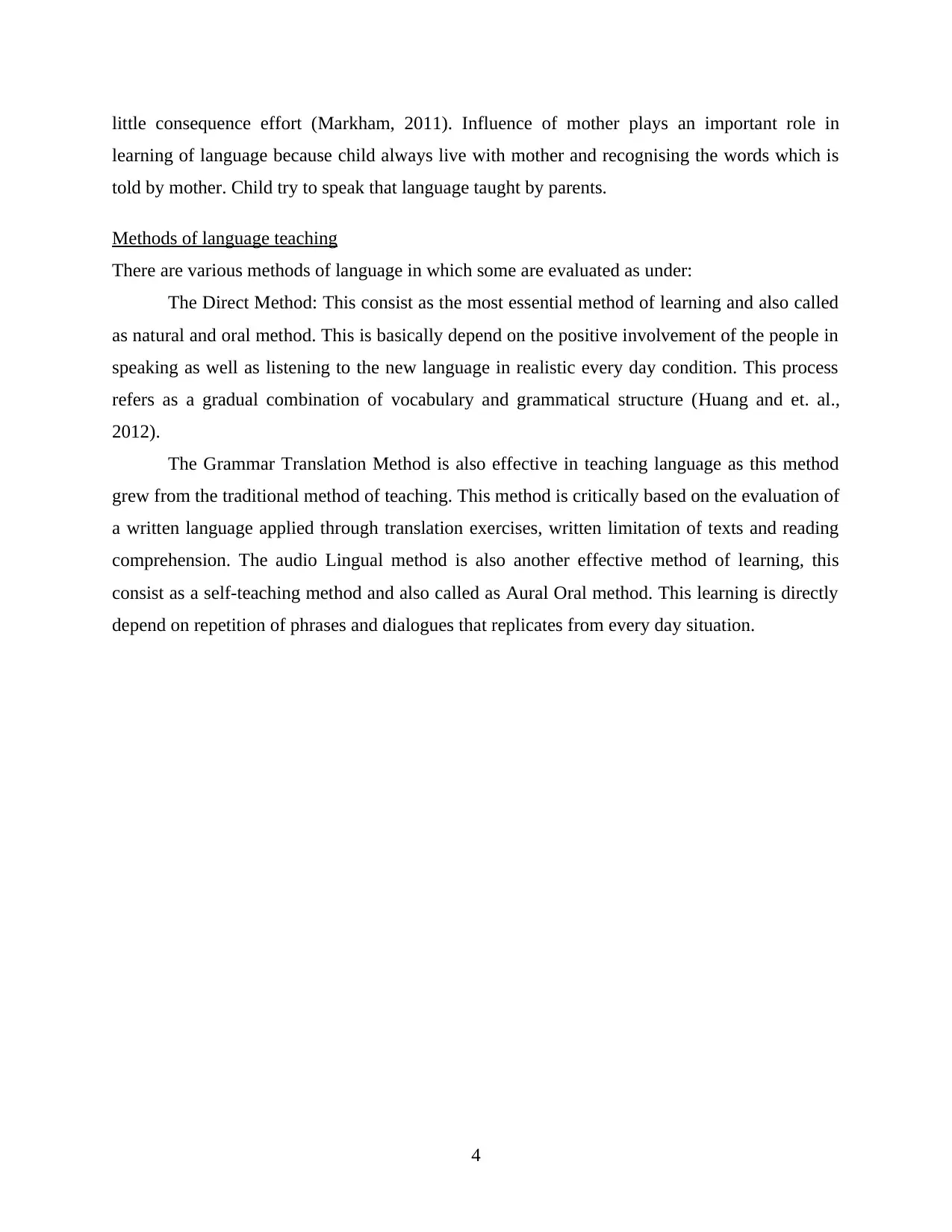
little consequence effort (Markham, 2011). Influence of mother plays an important role in
learning of language because child always live with mother and recognising the words which is
told by mother. Child try to speak that language taught by parents.
Methods of language teaching
There are various methods of language in which some are evaluated as under:
The Direct Method: This consist as the most essential method of learning and also called
as natural and oral method. This is basically depend on the positive involvement of the people in
speaking as well as listening to the new language in realistic every day condition. This process
refers as a gradual combination of vocabulary and grammatical structure (Huang and et. al.,
2012).
The Grammar Translation Method is also effective in teaching language as this method
grew from the traditional method of teaching. This method is critically based on the evaluation of
a written language applied through translation exercises, written limitation of texts and reading
comprehension. The audio Lingual method is also another effective method of learning, this
consist as a self-teaching method and also called as Aural Oral method. This learning is directly
depend on repetition of phrases and dialogues that replicates from every day situation.
4
learning of language because child always live with mother and recognising the words which is
told by mother. Child try to speak that language taught by parents.
Methods of language teaching
There are various methods of language in which some are evaluated as under:
The Direct Method: This consist as the most essential method of learning and also called
as natural and oral method. This is basically depend on the positive involvement of the people in
speaking as well as listening to the new language in realistic every day condition. This process
refers as a gradual combination of vocabulary and grammatical structure (Huang and et. al.,
2012).
The Grammar Translation Method is also effective in teaching language as this method
grew from the traditional method of teaching. This method is critically based on the evaluation of
a written language applied through translation exercises, written limitation of texts and reading
comprehension. The audio Lingual method is also another effective method of learning, this
consist as a self-teaching method and also called as Aural Oral method. This learning is directly
depend on repetition of phrases and dialogues that replicates from every day situation.
4
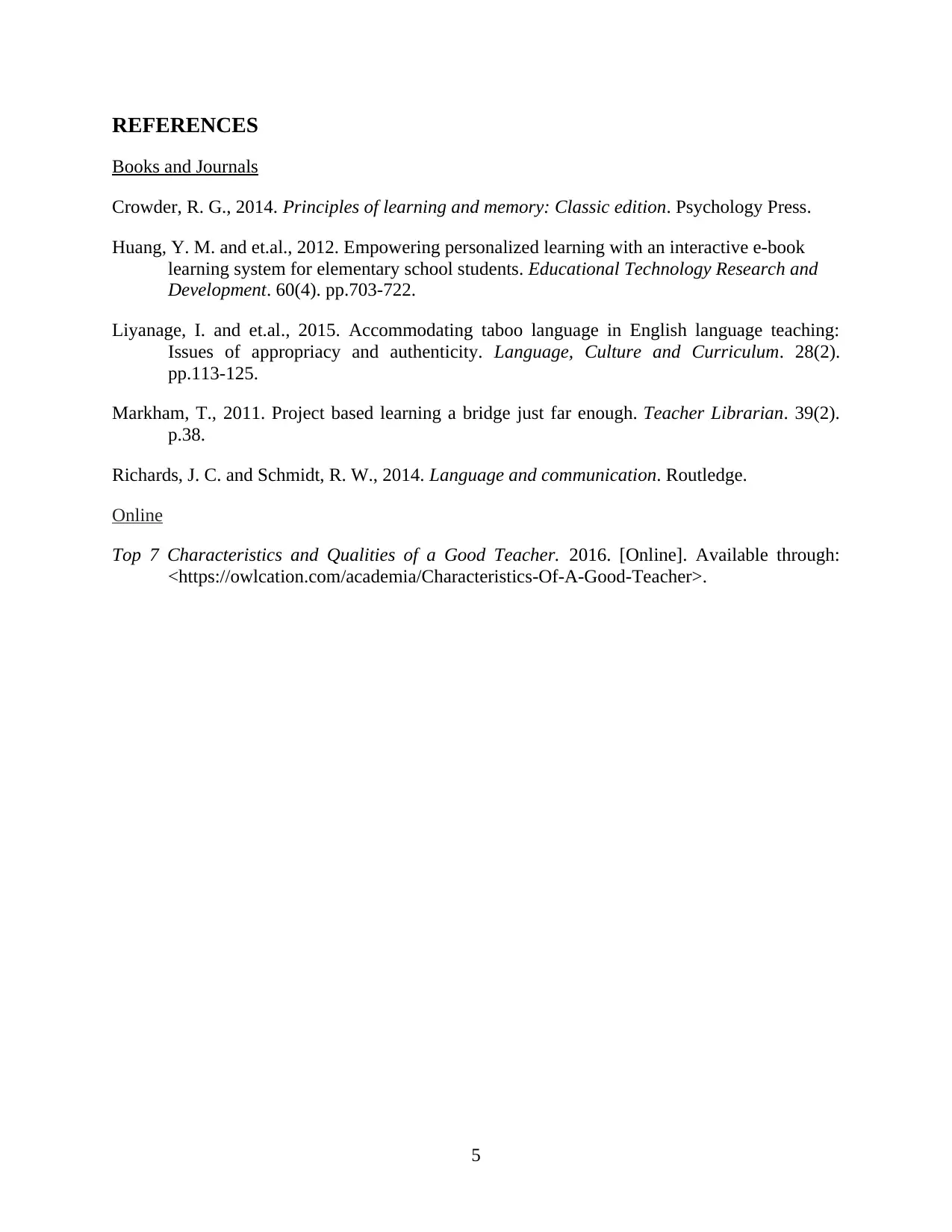
REFERENCES
Books and Journals
Crowder, R. G., 2014. Principles of learning and memory: Classic edition. Psychology Press.
Huang, Y. M. and et.al., 2012. Empowering personalized learning with an interactive e-book
learning system for elementary school students. Educational Technology Research and
Development. 60(4). pp.703-722.
Liyanage, I. and et.al., 2015. Accommodating taboo language in English language teaching:
Issues of appropriacy and authenticity. Language, Culture and Curriculum. 28(2).
pp.113-125.
Markham, T., 2011. Project based learning a bridge just far enough. Teacher Librarian. 39(2).
p.38.
Richards, J. C. and Schmidt, R. W., 2014. Language and communication. Routledge.
Online
Top 7 Characteristics and Qualities of a Good Teacher. 2016. [Online]. Available through:
<https://owlcation.com/academia/Characteristics-Of-A-Good-Teacher>.
5
Books and Journals
Crowder, R. G., 2014. Principles of learning and memory: Classic edition. Psychology Press.
Huang, Y. M. and et.al., 2012. Empowering personalized learning with an interactive e-book
learning system for elementary school students. Educational Technology Research and
Development. 60(4). pp.703-722.
Liyanage, I. and et.al., 2015. Accommodating taboo language in English language teaching:
Issues of appropriacy and authenticity. Language, Culture and Curriculum. 28(2).
pp.113-125.
Markham, T., 2011. Project based learning a bridge just far enough. Teacher Librarian. 39(2).
p.38.
Richards, J. C. and Schmidt, R. W., 2014. Language and communication. Routledge.
Online
Top 7 Characteristics and Qualities of a Good Teacher. 2016. [Online]. Available through:
<https://owlcation.com/academia/Characteristics-Of-A-Good-Teacher>.
5
1 out of 7
Related Documents
Your All-in-One AI-Powered Toolkit for Academic Success.
+13062052269
info@desklib.com
Available 24*7 on WhatsApp / Email
![[object Object]](/_next/static/media/star-bottom.7253800d.svg)
Unlock your academic potential
© 2024 | Zucol Services PVT LTD | All rights reserved.





